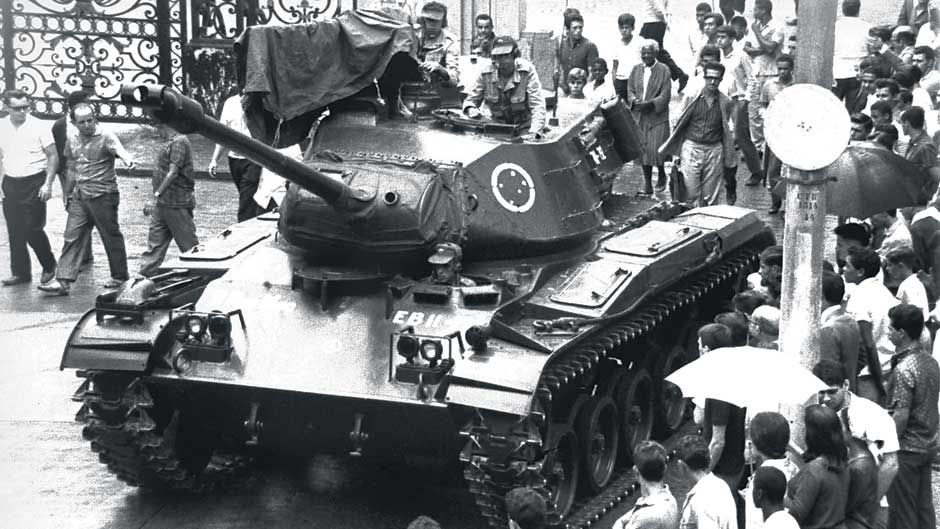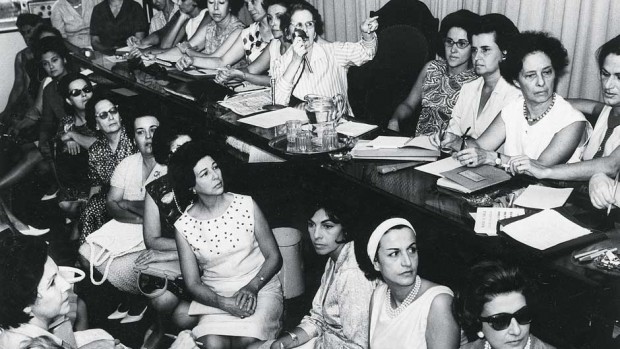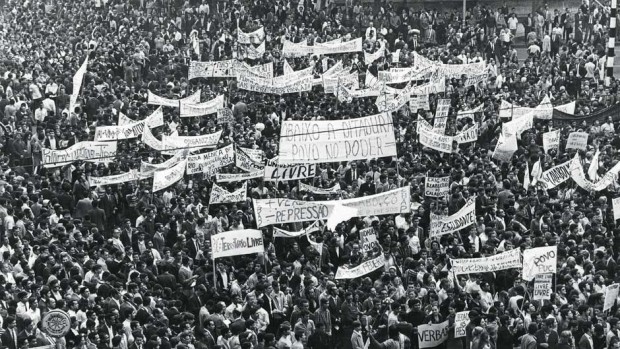50 years after the coup
Why did a coup which initially installed a moderate regime in 1964 end up becoming the longest and most brutal dictatorship in Brazil's history?

At 18:00 hours on March 31, 1964, President João Goulart was talking to General Peri Bevilacqua, Chief of Staff of the Armed Forces. The meeting took place at the Laranjeiras Palace, a Baroque jewel in the French renaissance style planted in a patch of the Atlantic rainforest in the heart of Rio de Janeiro. The subject was the same as he had had with his previous visitor, Senator and former President Juscelino Kubitschek, i.e. there was still time to save his government. If Goulart were to break from the more radical wing which wanted to change the rules of the power game with strikes and insubordination among the military, there was still a chance of reining in the forces that had been unleashed. In fact, this was no longer possible and the note the President received from his Justice minister, Abelardo Jurema, in the middle of the conversation was final proof of this. “General, General Mourão has raised the 4th Military Region in Minas Gerais and demanded my resignation. Do you think this is right?” he asked Bevilacqua. It may not have been right but it was what was happening. And it was not only General Olympio Mourão who was involved although the somewhat precipitate initiative in the field had been his. President Goulart (known as “Jango”) remained strangely calm and even almost too passive for those around him. He had already been deposed in practice and would take one wrong decision after another like a character in a Greek tragedy set in the tropics, incapable of altering his own fate. Two generals who did not get on well together but would succeed each other as Presidents, Humberto de Alencar Castell Branco and Arthur da Costa e Silva, fired off phone calls coordinating the conspiracy among the senior military, with operating questions in their minds and one unique and inescapable certainty: things would not continue the way they were.
The coup leaders had one overall objective that united them: getting rid of the government of João Goulart and freeing Brazil from the red threat. Getting rid of Jango (as Goulart was called) and overturning the risk of the country going Communist was time to celebrate. The press welcomed the coup overwhelmingly, with the solitary exception of the Última Hora newspaper. “Get out!” shouted the Correio da Manhã newspaperon commemorating Goulart´s fall. The former President, Juscelino Kubitschek, who was then a Senator, sympathized with the idea of seeing a general run the country until the president election of 1965, in which he was a favorite candidate. Carlos Lacerda, governor of Guanabara (as Rio de Janeiro state was then called), gave an interview hailing the military victory and could not contain his tears: “Thank you, my God, thank you very much!” The middle class in Rio de Janeiro was relieved and thousands of people met in a Victory March which was blessed by Cardinal Jaime Câmara for whom the coup had relied on the “divine help obtained by our Heavenly Mother”.

BLESSINGS… – In April 1964, women from Rio´s high society organized a Victory March that would be blessed by Cardinal Jaime Câmara
Once the objective which brought everybody together had been achieved and the euphoria was over, the stern face of reality reappeared. The pro-coup allies no longer had the strong link that had previously connected them and pressures – and counter pressures – soon began to appear which would harden and perpetuate the regime. A week after the coup, the Correio da Manhã was protesting against the burning of copies of the paper at the newsstands. It described the incident as an operation that “bore all the signs of intolerance and barbarism which mark the nature of totalitarian regimes”. Two months after the coup, Kubitschek, who had voted in favor of General Humberto Castello Branco for President, was removed from his position as a Senator. Three months after the coup, Lacerda saw that the civilians would be nothing more than assistants in the military regime and ended up calling Castello Branco a “Little Napoleon”, a jibe at the imperial style of the officer who was only 1.64 meters high. Two years after the coup, the middle class was scared by the belligerent reaction of the regime towards student protests and no longer recognized the government that it had previously supported. In 1968, four years after the coup, popular outrage was seen in the streets of Rio after the Military Police murdered an 18-year-old student. The protest went down in history as the Demonstration of the Hundred Thousand and was blessed by Cardinal Jaime Câmara, the same clergyman who had praised the victorious military years earlier. Finally, on December 13, 1968, General Arthur da Costa e Silva, Brazil´s second military President, signed the order known as the AI-5, an institutional deed that authorized the closure of Congress, ended parliamentary mandates, censored the press and governed by decree.
The AI-5 decree marked the official proclamation of a military dictatorship four years, eight months and 13 days after the coup. Why did the coup which initially installed a moderate regime end up becoming the longest and most brutal dictatorship in Brazil´s history? Breaks like this almost always get out of control. In his classic book “The Anatomy of Revolution”, historian Crane Brinton, who died in 1968, shows that most revolutions begin with hope, triumph under moderate leaders but end up becoming radical and wrecked by authoritarianism as a result of the inevitable internal contradictions. The cycle was repeated in the English, French and Russian revolutions that ended under the respective command of a regicide dictator (Oliver Cromwell), a Corsican warmonger (Napoleon Bonaparte) and a paranoiac tyrant (Joseph Stalin). In describing this process of authoritarian radicalization, Brinton was inspired by the declaration of an 18th century French revolutionary and wrote: “The revolution, like Saturn, devours its children”.
There was no revolution in 1964. The military had no shared doctrine that could give the coup this organic, deep-rooted character. However, there was a split that recalled to an extent the cycle described by Brinton. When Castello Branco, a cultivated officer, was in command, the regime had a liberal aspect that was against authoritarian barbarism. However, this ended under the iron fist of Emílio Garrastazu Médici who was the least averse of all the military presidents to using brute force. By around 1970, the coup had already sliced up the national institutions and was devouring some of its most prodigal sons. It even lost support of some of the elite and conservative politicians.

… AND BLESSED – In June 1968, protestors against the dictatorship who took part in the Demonstration of the Hundred Thousand were blessed by Cardinal Jaime Câmara, the same clergyman who had earlier praised the coup
The triumph of radicals of any ideology and in any regime stems from highly specific circumstances but is usually related to the organization and environment. The radicals are more disciplined and stubborn than the moderates. That is why they are usually better organized and committed. They are also favored by an environment in which any sign of moderation is seen as cowardice. The radicals in the 1964 regime hardened the regime to the point of introducing state terrorism to combat leftist terrorism, with the support or silence of the military commanders. They set off bombs and tortured prisoners. Right-wing extremists who had acted by themselves and at their own risk before the coup moved into the state machine and undermined military order. The radicalization of the hardliners created an atmosphere in which any moderate move was regarded as a sign of weakness.
Subverted by torture and anarchy, the regime deluded itself that it could eliminate the enemy in the secretive darkness of the cellar and through the silence of censorship. Torture and combatting the armed left achieved the immediate objective but accelerated the moral decay of the regime. The dictatorship never recovered from this. The thinker Hannah Arendt claimed that any state was doomed to failure if its aim was to make its enemies “disappear in silent anonymity”. Brute force ended up stripping the regime. Even today, half a century after the coup, in a Brazil in which almost everything is different from 1964, the military commanders refuse to admit that “fugitives”, “disappeared” people and “suicides” were actually murdered. As the military is an institution based on ethics, honor and loyalty, the Armed Forces still need to make an acknowledgement to society that they also condemn this period.



 SEGUIR
SEGUIR
 SEGUINDO
SEGUINDO

 ‘Reacendi uma chama em mim’, diz Fernando Fernandes após voltar a andar
‘Reacendi uma chama em mim’, diz Fernando Fernandes após voltar a andar Mulher que afirmou estar grávida de Neymar é presa em São Paulo
Mulher que afirmou estar grávida de Neymar é presa em São Paulo Palmeiras x Ceará: onde assistir, horário e escalações
Palmeiras x Ceará: onde assistir, horário e escalações Grande Rio se pronuncia sobre suposta exigência de Virgínia: samba sem Exu
Grande Rio se pronuncia sobre suposta exigência de Virgínia: samba sem Exu Morre Dorinha Duval, a primeira Cuca do ‘Sítio do Picapau Amarelo’
Morre Dorinha Duval, a primeira Cuca do ‘Sítio do Picapau Amarelo’





